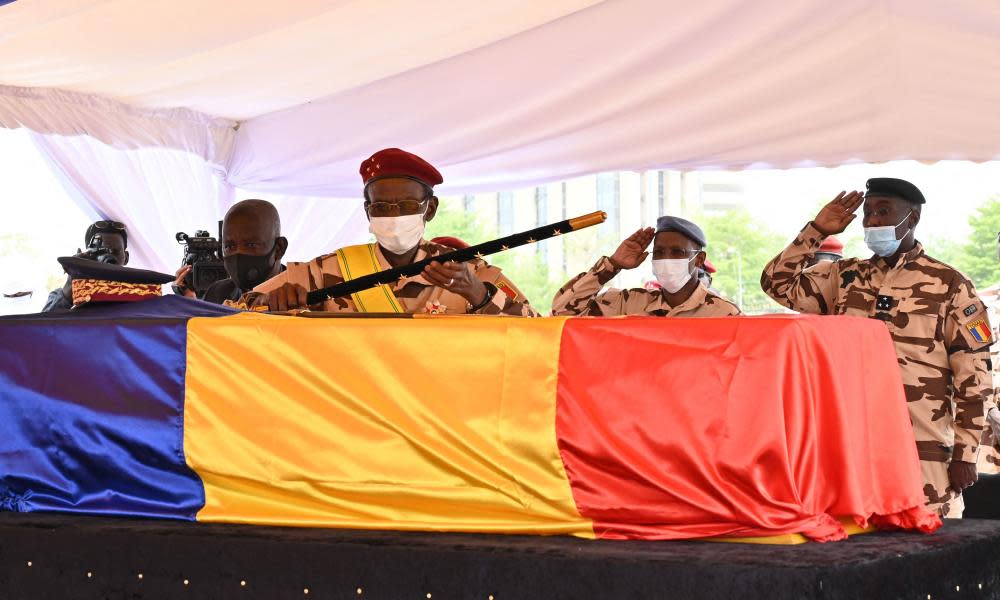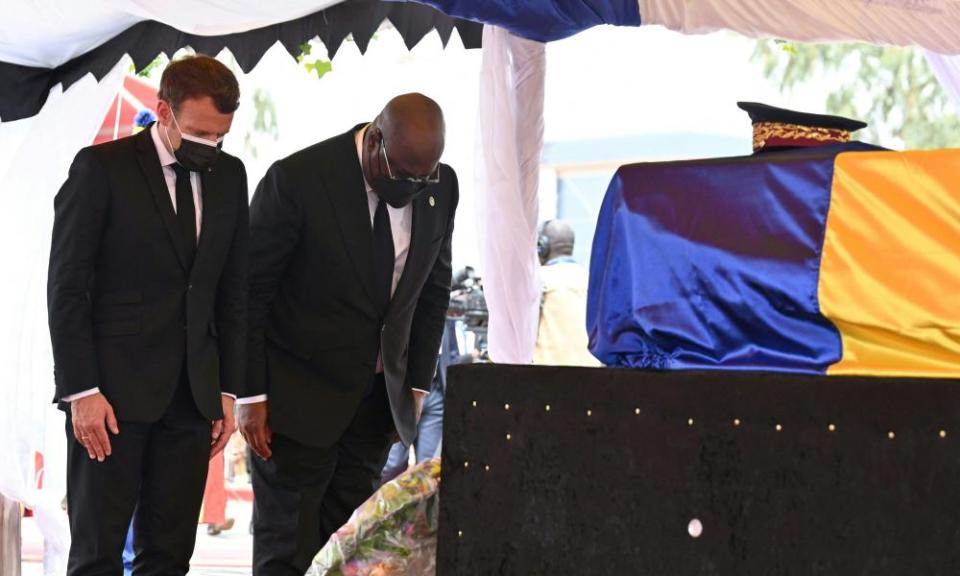Chad rebels prepare offensive as president Idriss Déby is buried

Rebels were preparing a new offensive towards the capital of Chad on Friday as dignitaries and supporters paid their final respects to Idriss Déby, the veteran ruler of the central African state, who died earlier this week from wounds sustained “on the battlefield”.
The Front for Change and Concord in Chad (FACT) said its forces were about 190 miles (300km) north of N’Djamena, the capital, but would observe a pause in hostilities to allow time for Déby, who was 68 when he died, to be buried.
“We will let them bury him … It’s a humane attitude” Sharfadine Galmaye, a spokesperson for FACT, said.
Galmaye said the rebels were willing to negotiate with the government to spare Chad further conflict. “We do not want to rule. We will choose an independent person who would be acceptable by all people to rule. We want them to leave their positions without a fight … We do not want to hurt anybody.”
A ceremony was held for Déby in N’Djamena on Friday, after which his remains were to be flown to his home town for burial.
In a speech over the flag-draped coffin, the authoritarian ruler’s son and successor, Mahamat Idriss Déby, 37, said he would “stay loyal to the memory” of his father and his legacy of “dialogue, forgiveness, peace, unity”.

The ceremony was attended by heads of state from across the Sahel region, as well as the French president, Emmanuel Macron, who pledged that France would not let “anybody question or threaten Chad’s stability”.
Rebel fighters swept across Chad’s northern border last weekend, timing their initial attack to coincide with elections on 11 April, which provisional results said Déby had won. Déby had been in power since 1990 and the victory would have given him a sixth term in office.
Déby’s death underlines the growing instability of the Sahel region, where a complex combination of economic, social, political and environmental factors is fuelling a series of crises. Some observers fear there could be extensive fighting in Chad, a strategically important central African country, before a stable political settlement is reached.
The late ruler’s son has been appointed interim president and is backed by a transitional council of the military. A former commander of the elite presidential guard, the younger Déby has said the army wants to return power to a civilian government and hold free and democratic elections in 18 months.
The political opposition has denounced the military’s takeover of control as a coup, saying that under the constitution, the speaker of the national assembly should have become interim president. “We know that the military and France forced his hand,” Yacine Abderamane Sakine, president of the Reformist party, said .
France, the former colonial power, saw Chad’s former ruler as a key ally in the region and the presence of Macron sends a strong signal of support for Déby’s son.
France has about 5,100 troops based across the region as part of international efforts to fight Islamic militants across the Sahel, including its main base in N’Djamena. The US also has military personnel there.
Succès Masra, another opposition leader, said in a video message that the people of Chad wanted change. Civil society organisations and lawyers also called for a return to civilian rule.
Saleh Kebzabo, president of the UNDR parliamentary group, said that “they all should sit down and talk, and there should be a mediation in one of the African countries like Mali”.
The exact circumstances of Déby’s death remain unclear. A former army officer who often joined soldiers on the front lines, he was mortally injured while visiting troops fighting the rebels around the village of Mele near the town of Nokou, more than 190 miles north of N’Djamena.
Such behaviour from Déby, a veteran soldier, was usual for a man whose power and mystique was founded on his military prowess, observers said.
Analysts and western diplomats in N’Djamena and the region gave differing versions of Déby’s death. Several said the former president had been badly hurt by artillery shells falling on his convoy as he left the frontline after speaking to soldiers, but others believed he had been shot during or immediately after negotiations with the rebels.
An official close to the Chadian army said Déby decided to visit the site of heavy fighting near Mao, the capital of Kanem state, when he learned that his troops were wavering under bombardment from rebels who had occupied higher ground and were thus able to inflict significant casualties.
“The [government] troops were forced back to where he was standing three times by the rebels, and each time he ordered them to go back. Finally, Déby himself tried to lead an attack against the rebels,” the official said. “When his vehicle became stuck in sand, many soldiers surrounded him in order to transfer him to another vehicle, but the [enemy] shot him at that moment.”
The spokesperson for the FACT movement accused the French air force of attacking the rebels on Thursday night. “We ask France to stand neutral in our struggle or we along with the Chadian people will fight them back,” Galmaye said.
Paris has defended the military takeover as necessary for security amid “exceptional circumstances” and called for the creation of a civilian government in Chad within a “limited period”. The US has also called for a transition to civilian rule.
N’Djamena and other cities are tense. Authorities were obliged to ask the population to remain calm when cannon fire was heard during Déby’s funeral.
Musa Ali, who works at N’Djamena’s Soq Galla’s market, said many residents had sent their families to their villages to keep them safe.
FACT is led by Mahdi Ali Mahamat, a veteran rebel fighter who spent time in exile in France before returning to Libya in 2015. His followers have fought for different factions in Libya, but most recently fought for military commander Khalifa Haftar, who is thought to have provided trucks mounted with heavy weapons.
Estimates of FACT’s fire- and manpower vary. When founded five years ago, the group claimed 1,500 fighters. The United Nations Libya panel of experts said in its December 2019 report that FACT had about 700 fighters.

 Yahoo News
Yahoo News 
